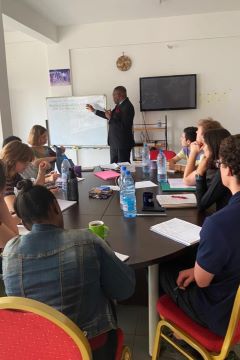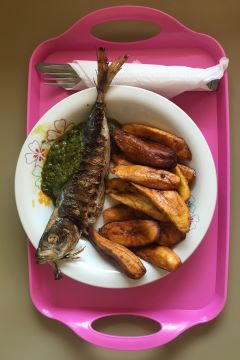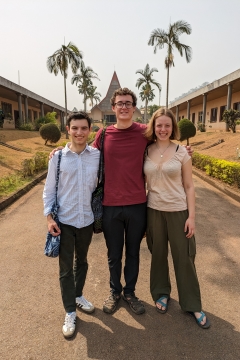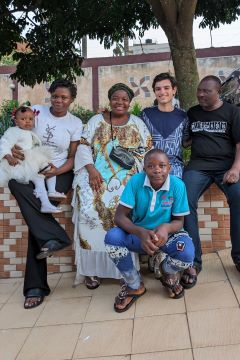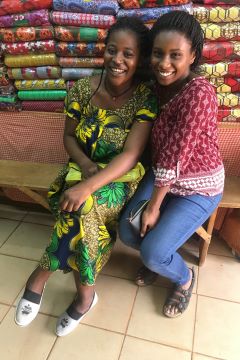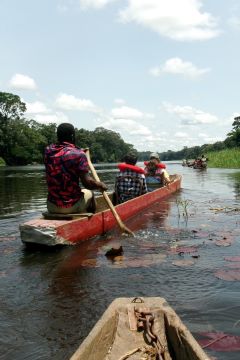Student Life
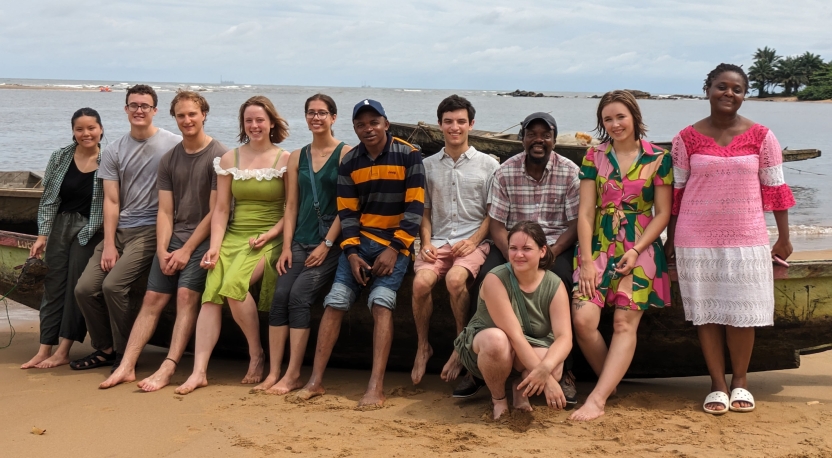
Students have opportunities to travel and learn about Yaoundé and other regions of Cameroon through the program.
Each semester, our program director and other staff lead a group trip. This is a great way for students to get to see village life in Cameroon under the guidance of local experts. Students are also strongly encouraged to get involved in independent co-curricular activities.
FAQs with Program Alumni
Learn more about the student experience and life in Yaoundé from Noah (Middlebury College) and Dora (Mount Holyoke College).
So you would take a base set of classes at the Centre in the apartment that we have there.
And you would take, there were options, there were two classes that were mandatory for everyone, Theories and Practices, Cultural Theories and Practices, and Women in Conflict, which was a class that our director Christiane taught.
And that class alternates by semesters.
I think, in the spring it’s the Women in Conflict in Cameroon and looking at the Anglophone crisis.
And then in the fall, it’s a literature class.
Yes.
Yeah.
And so then you could, on top of those classes, you could choose to either take Medumba, which is one of the languages in Cameroon that they speak.
And also you could choose to study history, or you could study both.
And it was history of Cameroon.
So you could on top of these base classes, you could choose another one.
And then optionally, you could choose to take a class at the university.
And so the majority, I think everyone chose to take a class at the university.
You have to take at least 1/2 a credit at the university.
And some people chose to take up to 1 1/2 credits, which is either two or three classes total.
Yes, and the classes vary.
And each week a new schedule comes out with the different course selections there are for the university. So you get to decide sort of as the weeks go.
It’s a very dynamic and very different educational system from the one here in the States. So it was cool to have the two sides. And I would say I learned just as much from being in that academic environment as I did from the classes themselves.Other than that you can also do, you have the option of doing an internship for credit as part of the Middlebury program as your 4th class. So lots of people did that as well, working at nonprofits or political research organizations and the likes.
The food is great.
As an American, it might take you a little bit of time to get used to at the beginning just because there are flavors in their dishes that oftentimes are not similar to anything that we have here, but the food is phenomenal and it’s all home cooked and the host families especially are phenomenal cooks.
And so we ate very well.
Yes, and you have to make sure to try to eat as much as you can, because otherwise your mother will push you to eat more and more and more.
So you have to- And say you’re not eating enough.
Exactly.
They’ll always say that.
They’ll always say that no matter what, though.
That they should go.
Yeah, they should go.
And also that you should try to meet as many people as you can, engage yourself in the community, find ways to explore yourself, explore people there, explore life there, and, you know, figure out what you want to do.
I mean, everyone in our group really did something different. People did things a lot on their own. We also did a lot of things together. It’s just a great opportunity to put yourself out there and to really roll with the tide.
Yeah.
Just be open with the experience, go in with no expectations.
It’s a ton of fun. It’s not as scary as it seems. And you’ll have a great time.
I loved my host family. That was one of the favorite parts of my experience. I was in a host family in the neighborhood called Montee Jouvence. And so there were my two host parents, Maman Chantal et Jean, and I called them Maman and Papa. And I got very close to them. And at any given point, there were probably between 10 and 15 other people living in the house with us, whether they be cousins or people working in the house, or the security guard. So it was a very dynamic and fun environment to live in.
Yeah… so I had a much smaller family, and so sometimes it would just be myself and my parents, or my host family parents, and sometimes their sons would come and visit, sometimes they wouldn’t. I also sort of had a host sister, Mabel, who was around often, and we talked about things like K-pop and similar interests of ours. And I also got to drive around the city a lot with my maman. And that was one of the really nice things is being able to travel and, you know, do very simple things: cook with your family, bring groceries in, shop in the market together. These were sort of the really nice, quotidian kind of activities you got to do.
And another great perk of the Middlebury program is that everybody’s in a host family, so you get to know all of the other host families. When you show up to another host family, you also call them “maman” and “papa”. So it’s a very communal family-based, fun way of life.
To get to classes every day, and to get around the city, you take taxis, because they’re shared taxis. You know it’s a shared taxi because it’s a yellow car, and how you use the taxis, you go to the side of the road.
You point in the direction of where you’re trying to go.
You shout where you want to go, how many places you’re taking up, and how much you’re willing to pay. And either the people will take you or they’ll just pass you by.
And then you ask another taxi.
There’s also a thing called Yango. Which is kind of like the Cameroonian version of Uber.
It’s a little less reliable than Uber, but if you need a way to get around from point A to point B directly, especially at night when you’re going out with friends, that’s the way to go.
I would say the highlight of the experience was just having the opportunity to make so many friends. It was such a social program and Cameroonians were so excited to meet us and so excited that we had the opportunity to be there and get to know them. I can say that as a general rule, most of the people who are on our program are probably in touch with at least, I don’t know, 20, 30 people, if not more, which I think is not something you can say about most study abroad programs. So the level of immersion is really high. And it’s really crazy and it’s fulfilling to watch how quickly and how intensely that immersion and that transformation happens.
The amount of free time you have depends, depending on what classes you wanted to take, whether you wanted to take a class at UCAC, the university, the Catholic University of Central Africa.
And if you decided to take a class there, you typically had a lot less free time, but there were a lot of people who had a variety of different hobbies and interests while we were there.
So some people enjoyed walking around, exploring the city. Some people were in the volleyball team at the university. So there were a lot of choices in terms of what you could do, and you could really explore your interests in the city.
And it’s a very dynamic and also kind of low key social culture there. So everybody’s very friendly with everybody. You spend a lot of time with your host family, with people you meet in the neighborhood and time there is very fluid.
So you spend time just walking around the neighborhood, catching up with friends, and it’s not quite you’re running on a schedule tight, tight, tight every day like you would be elsewhere.
And sometimes if you’re lucky, you get to go to the village with your parents, or they’ll take you to a wedding or some big event. And so that’s another really awesome opportunity you typically get.
I think going to the village with my host mother and meeting her sister and spending time in her village was really nice and understanding where she’s from and enjoying, you know, since Yaounde is such a busy city, it’s nice to be outside and to be able to see the stars at night. So it was a very nice, different experience in the midst of a busy kind of hustling life.
Going to the village was also a highlight for me. I spent a lot of time at a village called Sa’a. I met a Jewish community in Cameroon, a local Jewish community, and I had the chance to become very close to them and I made a lot of friends and spent a lot of time with them and they took me to their village where the synagogue is. So I would go every few weeks and that was a ton of fun. I really loved that.

